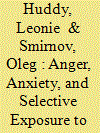|
|
|
Sort Order |
|
|
|
Items / Page
|
|
|
|
|
|
|
| Srl | Item |
| 1 |
ID:
181864


|
|
|
|
|
| Summary/Abstract |
We examine the political consequence of exposure to widely available video content of terror violence. In a two-wave survey of Americans, we assess who is exposed to, and seeks out, terror-related video content in the first wave and then observe who decides to watch raw video footage of the Boston marathon terror attack in the second. We focus centrally on anxiety and anger as differing emotional reactions to the threat of terrorism and document their influence on exposure to terror violence. Anxiety generates avoidance of violent terror content whereas anger increases its consumption. Moreover, we find that anger increases exposure to violent terror content and in addition enhances support for punitive and retaliatory anti-terrorism policy. We discuss the implications of our findings for the broader dynamics of terrorist violence and the emotional basis of selective news exposure.
|
|
|
|
|
|
|
|
|
|
|
|
|
|
|
|
| 2 |
ID:
141640


|
|
|
|
|
| Summary/Abstract |
Party identification is central to the study of American political behavior, yet there remains disagreement over whether it is largely instrumental or expressive in nature. We draw on social identity theory to develop the expressive model and conduct four studies to compare it to an instrumental explanation of campaign involvement. We find strong support for the expressive model: a multi-item partisan identity scale better accounts for campaign activity than a strong stance on subjectively important policy issues, the strength of ideological self-placement, or a measure of ideological identity. A series of experiments underscore the power of partisan identity to generate action-oriented emotions that drive campaign activity. Strongly identified partisans feel angrier than weaker partisans when threatened with electoral loss and more positive when reassured of victory. In contrast, those who hold a strong and ideologically consistent position on issues are no more aroused emotionally than others by party threats or reassurances. In addition, threat and reassurance to the party's status arouse greater anger and enthusiasm among partisans than does a threatened loss or victory on central policy issues. Our findings underscore the power of an expressive partisan identity to drive campaign involvement and generate strong emotional reactions to ongoing campaign events.
|
|
|
|
|
|
|
|
|
|
|
|
|
|
|
|
| 3 |
ID:
126423


|
|
|
|
|
| Publication |
2013.
|
| Summary/Abstract |
The Socially Mediated Internet Survey (SMIS) method is a cost-effective technique used to obtain web-based, adult samples for experimental research in political science. SMIS engages central figures in online social networks to help recruit participants among visitors to these websites, yielding sizable samples for experimental research. We present data from six samples collected using the SMIS method and compare them to those gathered by other sampling approaches such as Amazon's Mechanical Turk. While not representative of the general adult population, our SMIS samples are significantly more diverse than undergraduate convenience samples, not only demographically but also politically. We discuss the applicability of the method to experimental research and its usefulness for obtaining samples of special, politically relevant subpopulations such as political sophisticates and activists. We argue that the diversity of SMIS samples, along with the ability to capture highly engaged citizens, can circumvent questions about the artificiality of political behavior experiments entirely based on student samples and help to document sources of heterogeneous experimental treatment effects.
|
|
|
|
|
|
|
|
|
|
|
|
|
|
|
|
|
|
|
|
|